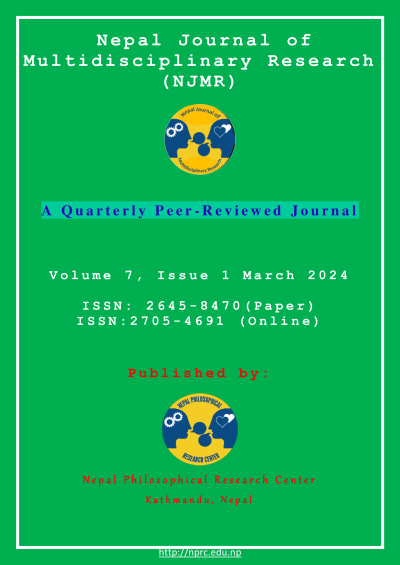Healing through Ruqyah and Academic Achievement of Children in Muslim Community
DOI:
https://doi.org/10.3126/njmr.v7i1.65269Keywords:
academic, achievement, children, healing, Muslim community, RuqyahAbstract
Background: Ruqyah, an Islamic alternative healing practice, involves treating illnesses using Quranic verses and invocations, focusing on the names and attributes of Allah. The literature on the academic performance of Muslim children in Nepal and the use of Ruqyah is limited and requires further exploration. This study aimed to identify the use and practice of Ruqyah in healing children within the Muslim community and assess their academic achievement.
Methods: This study explored the issue among the seven participants of four families from Muslim community who undergo Ruqyah often via a descriptive phenomenological method that included in-depth interviews. Three themes emerged from the interview data which offered insight into the Muslim community.
Results: Parents found the use of Ruqyah and children's academic achievements reasonable. Muslims respect the Holy Quran as the word of God, using it as guidance for Ruqyah and their children, as they believed it was the right choice. The study found that the family preferences dictated whether to take it immediately or only when needed. Children who followed Ruqyah and supplemented it with modern medications improved health patterns and their academic success.
Conclusion: Children who undergo Ruqyah are influenced by their parents' religious knowledge, educational level, and socio-economic background, and are academically prepared. Medications are used, with parents believing that aligning with Ruqyah improves their children's academic performance.
Novelty: The study could lead to new therapeutic research directions for the Muslim communities in Nepal, assisting children in coping with illnesses and improving their academic outcomes.
Downloads
Downloads
Published
How to Cite
Issue
Section
License
Copyright (c) 2024 The Author(s)

This work is licensed under a Creative Commons Attribution-NonCommercial 4.0 International License.
This license enables reusers to distribute, remix, adapt, and build upon the material in any medium or format for noncommercial purposes only, and only so long as attribution is given to the creator.




